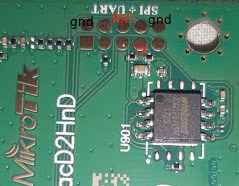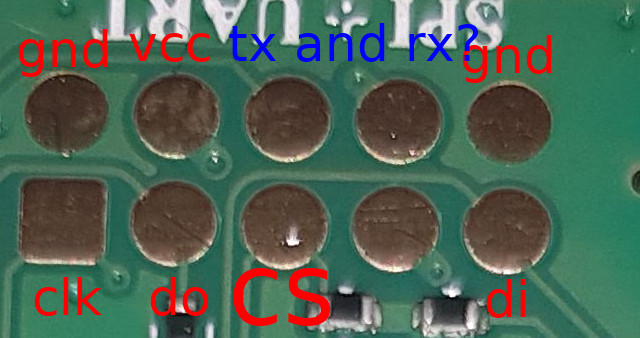Ok, found some time to revisit this, i got uart pinout wrong first time. The correct pinout is same as for RouterBOARD RBM11g that has the same 10 pin header and is already supported by openwrt.

Now on power on we get this over uart:
[12:30:34:785] Format: Log Type - Time(microsec) - Message - Optional Info␍␊
[12:30:34:785] Log Type: B - Since Boot(Power On Reset), D - Delta, S - Statistic␍␊
[12:30:34:785] S - QC_IMAGE_VERSION_STRING=BOOT.BF.3.1.1-00096␍␊
[12:30:34:785] S - IMAGE_VARIANT_STRING=DAABANAZA␍␊
[12:30:34:785] S - OEM_IMAGE_VERSION_STRING=CRM␍␊
[12:30:34:785] S - Boot Config, 0x00000020␍␊
[12:30:34:788] S - Core 0 Frequency, 0 MHz␍␊
[12:30:34:790] B - 262 - PBL, Start␍␊
[12:30:34:792] B - 1344 - bootable_media_detect_entry, Start␍␊
[12:30:34:796] B - 1688 - bootable_media_detect_success, Start␍␊
[12:30:34:801] B - 1702 - elf_loader_entry, Start␍␊
[12:30:34:806] B - 5149 - auth_hash_seg_entry, Start␍␊
[12:30:34:810] B - 7333 - auth_hash_seg_exit, Start␍␊
[12:30:34:812] B - 585171 - elf_segs_hash_verify_entry, Start␍␊
[12:30:34:819] B - 702378 - PBL, End␍␊
[12:30:34:819] B - 702402 - SBL1, Start␍␊
[12:30:34:828] B - 790991 - pm_device_init, Start␍␊
[12:30:34:832] D - 6 - pm_device_init, Delta␍␊
[12:30:34:842] B - 792522 - boot_flash_init, Start␍␊
[12:30:34:879] D - 45799 - boot_flash_init, Delta␍␊
[12:30:34:883] B - 842524 - boot_config_data_table_init, Start␍␊
[12:30:34:893] D - 3889 - boot_config_data_table_init, Delta - (419 Bytes)␍␊
[12:30:34:893] B - 849741 - clock_init, Start␍␊
[12:30:34:902] D - 7583 - clock_init, Delta␍␊
[12:30:34:902] B - 861856 - CDT version:2,Platform ID:8,Major ID:1,Minor ID:0,Subtype:0␍␊
[12:30:34:911] B - 865345 - sbl1_ddr_set_params, Start␍␊
[12:30:34:918] B - 870332 - cpr_init, Start␍␊
[12:30:34:918] D - 2 - cpr_init, Delta␍␊
[12:30:34:918] B - 874825 - Pre_DDR_clock_init, Start␍␊
[12:30:34:924] D - 4 - Pre_DDR_clock_init, Delta␍␊
[12:30:34:928] D - 13148 - sbl1_ddr_set_params, Delta␍␊
[12:30:34:928] B - 888526 - pm_driver_init, Start␍␊
[12:30:34:932] D - 2 - pm_driver_init, Delta␍␊
[12:30:34:997] B - 959606 - sbl1_wait_for_ddr_training, Start␍␊
[12:30:35:002] D - 30 - sbl1_wait_for_ddr_training, Delta␍␊
[12:30:35:013] B - 975225 - Image Load, Start␍␊
[12:30:35:156] D - 143584 - QSEE Image Loaded, Delta - (267732 Bytes)␍␊
[12:30:35:161] B - 1119309 - Image Load, Start␍␊
[12:30:35:164] D - 1445 - SEC Image Loaded, Delta - (2048 Bytes)␍␊
[12:30:35:171] B - 1129723 - Image Load, Start␍␊
[12:30:35:182] D - 15848 - APPSBL Image Loaded, Delta - (27608 Bytes)␍␊
[12:30:35:188] B - 1145989 - QSEE Execution, Start␍␊
[12:30:35:200] D - 58 - QSEE Execution, Delta␍␊
[12:30:35:200] B - 1152110 - SBL1, End␍␊
[12:30:35:200] D - 451820 - SBL1, Delta␍␊
[12:30:35:200] S - Flash Throughput, 1852 KB/s (297807 Bytes, 160735 us)␍␊
[12:30:35:210] S - DDR Frequency, 537 MHz␍␊
Then uart is disabled.
Ps: it's posible to get a root shell on ROS using usb drive method described here.
https://github.com/0ki/mikrotik-tools


